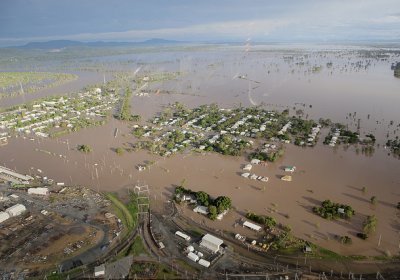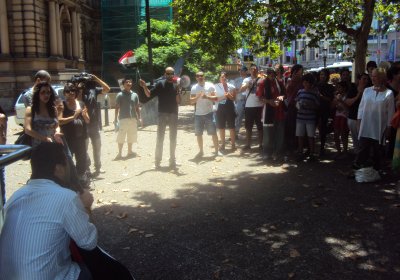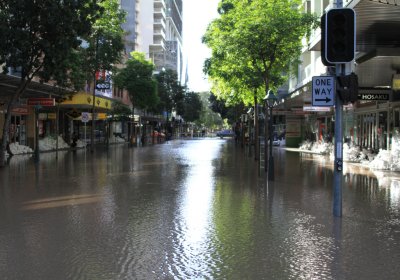Householders and small businesses who were victims of the floods that hit Brisbane in January are considering a legal challenge against insurance companies “using region-wide hydrology reports to deny thousands of flood-related claims”, the March 10 Courier Mail said.
Insurers NRMA, CGU and Comminsure have used the reports to claim many policyholders were subject to riverine flooding, which is not covered by most insurance policies, rather than stormwater or flash-flooding.
Jim McIlroy
Two hundred people rallied outside the Queensland parliament on March 5 to oppose plans by coal seam gas company QGC to expand its operations near the town of Tara, 300 kilometres west of Brisbane.
Friends of the Earth campaigner Drew Hutton chaired the rally. Other speakers included Tara resident Scott Collins as well as campaigners and farmers from the Lock The Gate Alliance — a national campaign to keep coal seam gas companies off private land.
A rally was held on February 28 to protest against the recent decision of a London court to extradite WikiLeaks editor-in-chief Julian Assange to Sweden to face questioning on allegations of sexual assault.
Assange’s legal team announced it would appeal the decision.
The rally was held under the themes "We deserve the truth!”, “Hands off WikiLeaks!” and “Free Julian Assange!"
Insurance companies are collecting about $300,000 in interest every day they hold off paying the victims of Queensland’s flood disaster, said the February 28 Courier Mail.
The floods swept through the state in January. Six weeks later, just 10% of claims had been paid.
The insurance industry has raked in big profits in the past few years. The Courier Mail said “net profit for general insurers soared from $2.8 billion to $4.44 billion. Total assets jumped from $65 billion to $98 billion.”
About 50 angry policyholders — victims of the huge floods that inundated large parts of Brisbane in January — protested outside the South Bank offices of insurance company CGU on February 18. The noisy protest presented a list of demands to the company, the February 19 Courier Mail said.
About 200 people rallied in Brisbane's King George Square on February 25 to show solidarity with the people of Libya resisting the oppressive regime of Muammar Gaddafi. A banner proclaiming "Free Libya" was fixed to a wall, together with photos of victims of the Libyan military and police.
Placards carried by members of the Libyan community, many of them students, read "Stop using mercenaries to kill our people" and "Please help our country".
The popular uprising which has swept Egypt over the past two weeks, inspired by the revolt which drove the Tunisian dictator from power in mid-January, is the expression of a people’s power movement in the Arab world which has been 40 years in the making.
I have been waiting for this for a long time. I lived in Cairo for six months in the first half of 1967, until the so-called Six Day War forced my family to leave Egypt for Britain.
My father was a meteorological scientist working through the United Nations with the Eqyptian agriculture department for a time.
"As we speak, Egypt is on fire," Arab community activist Omar Mostafa told about 50 people who attended a snap protest rally in support of the recent democracy protests in Egypt at Town Hall Square on January 29.
The recent Queensland and Victorian floods make it clear — Australia needs a comprehensive, national, public insurance scheme, to cover floods, bushfires and other major natural disasters.
The Australian Museum hosted a debate on January 23 on the topic: “Is the 26th of January the most appropriate date to celebrate our national identity?”
Sixty people attended the debate, which pitted historian and educator Nigel Parbury against Brisbane indigenous leader and Socialist Alliance member Sam Watson.
Parbury put the affirmative case and said that Australia Day had changed over the decades to better reflect the country's multicultural community. But he conceded that much more change was needed in future.
The flood disaster that struck three-quarters of Queensland over the past month and then spread to Victoria and Tasmania is the worst overall flood catastrophe in recorded Australian history. It has also inspired a massive outpouring of public sympathy and solidarity.
The disaster has shown in practice the huge potential for ordinary people to mobilise in support of fellow human beings in need of help.
Tens of thousands of Brisbane residents volunteered to help people whose homes had been flooded by the raging Brisbane River, especially over the weekend of January 15-16.
"You can't come in”, Friends of the Earth (FOE) organiser Drew Hutton told mining companies on behalf of a coalition of farming groups from South-West Queensland, outside State Parliament on November 22.
The farmers launched the campaign in opposition to mining companies’ plans for up to 40,000 coal seam gas wells and massive new coal mines on the farming land of the Darling Downs.
"All the laws are weighted in favour of the mining interests and against farmers”, Hutton said.
- Previous page
- Page 87
- Next page








